- Home
- Brian Keene
The Library of the Dead Page 5
The Library of the Dead Read online
Page 5
MAUSOLEUM
It must be past midnight, yet these main doors to the building are wide open. Cold chills bubble like champagne poured down your spine, yet the doors are open arms, inviting, calling you to come inside. The golden glow emanating from within pulls you closer, and then closer, until you are no longer on the sidewalk at all but standing on the first steps, and then you are suddenly under the framework of the doors, your head peering through, then the rest of you, and finally you are inside and wide-eyed.
The foyer is nothing spectacular, resembling a hotel lobby more than a mausoleum, and the golden glow does not emanate from this particular room, but permeates from the maze of rooms further inside.
What startles you is the hooded figure.
“Welcome to The Library of the Dead,” the figure says, sweeping a gangly arm in an arc matching that of the entryways. The voice is chant-like and neither masculine nor feminine. He or she turns in a fluid motion and gestures for you to follow, then disappears into the first of many rooms.
The cloaked arm sweeps the next room, pointing out the endless shelves of golden books encased in glass. The oversized books create the glow, you realize, for there are countless volumes, thousands, hundreds of thousands on display in the building, you imagine, most gold or etched in gold. Vaulted ceilings leading to beautiful stained glass, rooms leading to more rooms, and then more rooms, and then even more rooms, each unique, each glowing differently because of their design, a Moorish- and Gothic-inspired maze of rooms, with ornate stonework at every curve, mosaics at every turn, statues, fountains—yes, that is water you hear—and gardens—green and colorful and growing within the building, and yes, that is life you smell—and private chapels. All of it seems endless, or perhaps eternal. 1909, you remember reading about this place, and not a library, per se, but—
“Called so because each of these golden tomes contains the entombed ashes of a fascinating person.”
The hooded figure bows politely.
Cinerary urns.
“And I am your guide, your librarian.”
The librarian, whose features remain shadowed by a cowl, continues: “Here, within these golden covers, are ancient legends, ethnic myths, and much realistic magic.”
The figure floats to the topmost shelf as if lifted on a gust of air, withdraws three golden books, and descends.
“Like these,” your librarian says, opening the first of the three.
THOSE WHO
SHALL NEVER
BE NAMED
YVONNE NAVARRO
January 9, 1947
The girl was a waitress and her name was Elizabeth. He’d had coffee in the restaurant several hours earlier and flirted with her just enough to where she’d remember his face when he “happened” to run into her on the street later. He followed her for a couple of blocks to make sure no one from her job saw him, then made his move, calling out to her and flattering her because he remembered her name from where she’d written it on the check. She was a looker, pale and young with curly black hair and light blue eyes. There was a faint, unfocused desperation about her, like she didn’t know where she was going or what to do next, and was looking for someone to take over for her. He was just the guy to show her the way.
There had always been a darkness in his soul. Hungry, waiting beneath the surface of his barely contained humanity, knowing that someday its will would win over his. Tonight, surrounded by the damp, chilly breeze, he surrendered and let it take him where it would, down a path that could never be reversed. He thought that when this happened—and he’d known it eventually would—he would regret it. He’d thought he would be heavy with guilt, remorseful. Instead, he reveled in the freedom of letting go, even wallowed in it. It was joyous and sweet and indescribably evil.
January 15, 1947
Tommy Milner was walking along the side of the road in Leimart Park when he realized he was coming up on a car parked off to the side with its headlamps angled just enough to spill light into the abandoned lot next to it. He froze, watching as a dark-haired man hauled first one, then another oversized package out of the trunk; they were clearly heavy and he carried them a few feet off the road one at a time and set each carefully down. Always the enterprising teenager, Tommy crept closer, instinctively making his footsteps soundless as he extinguished his cigarette and pocketed the butt to finish later. Maybe the man was a robber, or a mob guy burying a load of money to be dug up after the heat was off him. Tommy wasn’t particularly bright but he knew the score—or thought he did—and he figured he’d hide out and pick up the loot after the guy was gone. He dropped into the ditch about twenty feet behind the car, huddling into his leather jacket for warmth and ignoring the clammy, unpleasant dirt, convinced that this was going to be the luckiest night of his life.
That all changed when the man unwrapped the parcels.
He was a fastidious man, precise, thorough to a fault. It took time to decide how to place her—her hands, her hair, the top and bottom. He wore gloves, of course, even though he had done the bulk of the work and the cleaning up in the privacy of his home; although this was his first time, he knew it would not be his last and had therefore amassed a profusion of implements for just this occasion. He wanted her to be relaxed in her slumber, exquisite with the modifications he had given her. Her beauty would be preserved forever; there would be photographs taken, books written. Not by him, of course, but about him, and her, and what he had done to her.
He backed up, inspecting his work with the critical eye he knew would be forthcoming by law enforcement and journalists alike. No, the arms weren’t right—they had to be above her head, as if she had thrown herself back on a bed, her dark curls arranged just so. She was smiling, ear to ear as he had insisted, although the ropes had left marks around her wrists that he couldn’t erase—too bad. There were some other marks that also couldn’t be disguised, like the part of her breast that he had cut into—
He jerked and raised his head from where he had been bending over her, then looked back toward the road. He’d heard something … maybe. He strained to see but the headlights of his own car blinded him, turning everything behind them to an abyss. Straightening slowly, he walked back to the car, then stepped behind the lights. It took a few moments for his eyes to adjust, but although he scanned the area carefully he still didn’t see anything. He waited, always patient, for several minutes, but the noise didn’t come again. Probably a stray cat, or perhaps a rat. The thought disturbed him as he went back to where Elizabeth lay, wrapped in the sleep of eternity, and he hoped she would be found before animals maimed his perfect handiwork.
A few more adjustments, a gathering of materials, and he was finally finished. As he drove away, he relished the thought of the days to come, and the way everyone would marvel at the wonderful piece of art he had created.
It took the man a few minutes to strip off his gloves and push the blankets, or whatever they were, into a paper bag. By the time the car was rolling slowly away, Tommy had wiggled up close enough to the road to read the car’s license plate. He had nothing to write on so he repeated it to himself over and over, knowing that otherwise he’d never remember it. Half an hour later he made it home and scribbled it on a piece of paper, then he could finally sit down and think about what he’d seen, the whole picture. He should tell the cops, but his old man was on the force and he and Tommy had been going at it for the last year, ever since Tommy had graduated high school but not found a job. Truth was, Tommy was more interested in hanging on the street corners with his pals; the senior Thomas Milner—Tommy was a junior—routinely called them all street thugs. He’d probably accuse Tommy of killing that woman and then things would get a hundred—no, a thousand—times worse. Nah, better to dig around on his own. He’d learned a few things by listening to what his father said about finding public information at the library. Once he traced the license plate number and found out who the murderer was, it was a short hop from there to heroism. He couldn’t wait to see the look on
Detective Milner’s face.
A week later he was on his way to eat at a nice little diner a world away from the one in which he had first put Elizabeth Short—he had learned her full name from the newspapers—in his sights, when he realized he was being watched. He stopped and bent over so that it looked like he was tying his shoelace, and a quick scan of the area across the street confirmed it. There, leaning just on the other side of a lamp post, was a young man in a beat-up leather coat and baseball cap. His face was lowered and indistinguishable, but the outfit was solidly blue-collar: checked shirt collar crushed beneath the top of the leather coat, denim jeans, white socks and dusty black shoes.
He straightened and moved forward, walking at a crisp pace but keeping his watcher in sight without actually looking straight at him. The man paced him along the sidewalk across the street with almost no skill at concealing himself. Obviously not the police, but being followed was irritating and made him discard his plans for dinner and head for his car instead. He would leave this foolishness behind and find somewhere else to enjoy a meal. A coworker had told him about a place called Philippe’s over on Aliso Street and recommended a sandwich they had called a “French Dip.” It sounded interesting and he’d lost his taste for anything more … involved this evening anyway.
When the killer did an about face and headed back to his car, Tommy figured he’d been made. Even so, as long as he kept his distance he ought to be okay. What was the guy gonna do, call the coppers? He had it all thought out, and the guy’s choice of a one way street had made it even easier; Tommy was driving his buddy’s car and he’d found a parking space three cars up; unless his target tried a U-turn to go the wrong way in the middle of the evening traffic, there was nowhere for him to go but right past Tommy. Tommy pulled out behind him and stayed just close enough to where he could jump on it if the man tried to lose him.
Six blocks later, that’s exactly what the murdering bastard tried to do, and an hour later Tommy couldn’t have recounted their route if he’d tried. The guy had started by turning left and right seemingly at random, then he’d finally made a flat-out run for the highway. That’s where they were now, on 101 and headed north. That was fine with Tommy; he’d filched some cash from the rent money jar his old man didn’t know he’d found, then filled up the tank and bought himself some cigarettes and snacks. That wasn’t all he’d taken from the house this morning, so he was feeling pretty good about what the evening would hold. Damned good, in fact.
Tommy dropped back a little, letting a car pass him and get between him and the killer. That would give the guy a false sense of security and it might make him think he wasn’t being followed any-more; there weren’t many turnoffs and Tommy was staying close enough to see him around the car in front of him— he’d catch it if the car turned onto some side road. Grinning, the young man settled back and turned up the radio, ready to see where this ride would take him.
He was still being followed. Although the vehicle had dropped back a car or two, there was so little traffic on this road that it wasn’t hard to keep the headlights in his rearview mirror. At first he wasn’t sure where he was going—he was just driving, vaguely turning over routes that might let him throw the guy off. Logic told him that the longer he was followed, the safer he was, if for no other reason than it led away from his home in the Los Angeles area and Leimert Park, where he’d killed the girl. It couldn’t be the police following him or he would have already been arrested, or at least questioned. As he was driving, he had a flash memory of the night he’d sent Elizabeth Short to her maker and that moment when he’d thought he’d heard something. Perhaps it hadn’t been a rat after all, or at least not the rodent kind. If that was the case, he was going as far as this guy was willing to follow him.
Almost nine hours later, though, he’d had enough. He was running out of patience, low on fuel again after stopping nearly a dozen times, and he wanted nothing more than a hot plate of food and a warm bed. He swung off the highway toward Oakland, heading east with the thought of finding somewhere—anywhere—that he could put this farce of a car chase to an end. He made random turns but the smaller streets and the traffic, even at this late hour, worked against him. Eventually though, destiny threw him a bone, and a few miles into Oakland proper, the answer was right in front of him:
MOUNTAIN VIEW CEMETERY
What better place than a graveyard to take care of this problem and hide the results?
Tommy followed the killer at the turnoff to Oakland, staying close to make sure no one pulled between them. He was done with any pretense—the guy knew he was there and it no longer looked like he was making any effort to get away. They were headed to a showdown, but Tommy was okay with that. His cash was about gone and he was bone tired; he’d filled up every time the other man did and almost lost him every damned time. It was almost 5:00 AM, and unless the guy he was chasing was some kind of Superman, this cat and mouse had to come to an end. The guy was a killer but his weapon was a knife, or a saw, or maybe both—who really knew? Tommy had read about his dirty work in the paper, how he had cut that poor girl’s face up and then chopped her body in half. Tommy half-grinned, half-grimaced, then reached over and touched the .38 Colt he’d taken out of the backup holster hanging in his dad’s closet. The metal was cold and filled the air around him with a heavy scent of gun oil that couldn’t be overcome by his cigarette smoke. Somehow its presence didn’t give him nearly the feeling of security he thought it would, but he wasn’t going to turn back now. He might not be the expert at shooting that his old man was, but how hard could it be? You just had to be close enough to the target, that’s all.
Still, Tommy couldn’t help a feeling of the creeps as he followed the killer into Mountain View Cemetery.
He’d hoped to finally lose his follower within the twisting, circling lanes of the cemetery. No such luck; his own car was a fine automobile, but the vehicle tailing him must have been “souped up,” as the young people were saying nowadays. Nothing he did would shake the guy, and he was starting to feel like a mouse trapped in a maze with a hungry weasel—no matter which way he ran, the predator was always just behind him.
Enough. He’d managed to navigate the routes sufficiently to see that he was nearly back where he’d started, but a glance at his fuel gauge showed that the car was already close to empty. He was angry now, so much so that he was ready to have an in-person meeting. The whole thing might be a prank, some initiation cooked up by one of the street gangs that were so prevalent in Los Angeles, and the thought really fed his temper. On the other side of the ornate gates was a huge stone building, but he couldn’t tell in the dark if it was a chapel or an expansive mausoleum. He swung his vehicle to the curb then leaned over and slid a black briefcase from beneath the front of the passenger seat. Rather than open his bag of tools, he took it with him as he stepped out of the car and hurried toward an arched, deep-set doorway that seemed to be the building’s main entrance. As he ducked into the shadows he heard the slam of a car door as the other driver exited his car.
Excellent.
Tommy ran after the killer, his old man’s Colt clutched so tightly in his right hand that his fingers ached. He’d never fired a gun but it didn’t take a college degree to point the thing and squeeze the trigger. He’d seen pictures in the paper that showed what this guy had done to that woman, so if it came down to it, he was sure he could step up. In fact, maybe that would be the best thing all around—kill the killer, right? Rid the world of the sicko and pull in the credit. He could see the headlines now: TOMMY MILNER A HERO FOR CATCHING MURDERER! There would be radio and television interviews, maybe even book deals. He grinned, but that expression disappeared as he edged up to the arch that covered the doorway the other man had gone into. This wasn’t going to be a cakewalk so he’d better pay attention.
“Come out,” he ordered. “I’ve got you covered.” He cringed, partly because his voice sounded so loud against the quiet of the empty street, and partly because the words were so
corny. “I’m not kidding,” he added.
The only reply was a chuckle, so low that at first Tommy wasn’t sure he’d heard it at all. Then it dawned on him that the man was laughing at him. Laughing! His face flushed. His father laughed at him just like that every time Tommy tried to talk about things he wanted to do, as though he believed Tommy wasn’t smart enough to do anything at all. The similarity between the two adults made his temples pound and he pulled in a breath to steady himself.
“I’ve got a gun,” he said. This time his voice was hard and flat. “I’m not so stupid I’m stepping in there with you. I’ll shoot first and let the cops ask questions later.”
At first there was nothing, then Tommy stepped back as he saw a darker man-shaped shadow shift inside the archway. But instead of coming toward him, the figure swung sideways. In the next second a door opened and light, bright and golden, cut through the darkness, making Tommy squint and instinctively raise a hand to shield his eyes. Darkness returned as the door swung shut, and this time Tommy swore and leaped forward. He yanked the door open again and saw he was facing the center aisle of a chapel; a dark-haired man was turning past the front pews at the far front, heading toward another closed door.
There was no more time to hesitate. Tommy went after him.
He hadn’t bargained on firepower, had assumed—stupidly, it turned out—that the thug following him would be armed with nothing more than brute force and scarred knuckles. It wasn’t, however, an idle threat; there had been enough of a glow from the streetlights to see the revolver aimed in his direction. He was more sure than ever that his stalker wasn’t a cop, but that just made him more dangerous. The police were brutal but they were far less likely to shoot someone who didn’t have a gun than a nervous, would-be vigilante. Based on that, any attempt at getting close enough to use one of the knives in his case would be unwise; he’d be shot and if he didn’t die outright, his identity would be splashed all over the tabloids. Unthinkable—he would have to put enough distance between them so that he could hide and then attack.

 The Rising
The Rising Entombed
Entombed Take the Long Way Home
Take the Long Way Home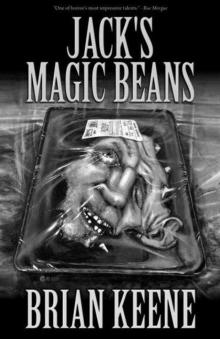 Jacks Magic Beans
Jacks Magic Beans Ghost Walk
Ghost Walk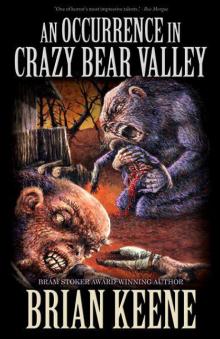 An Occurrence in Crazy Bear Valley
An Occurrence in Crazy Bear Valley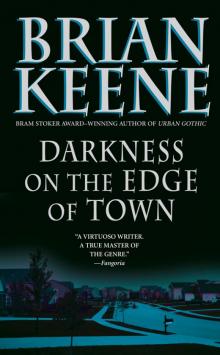 Darkness on the Edge of Town
Darkness on the Edge of Town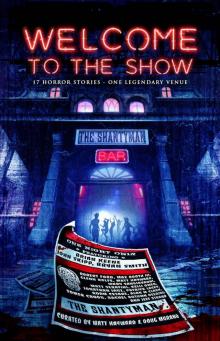 Welcome to the Show: 17 Horror Stories – One Legendary Venue
Welcome to the Show: 17 Horror Stories – One Legendary Venue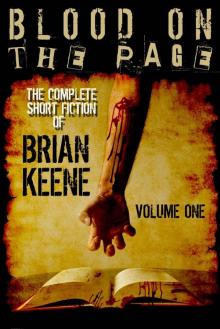 Blood on the Page: The Complete Short Fiction of Brian Keene, Volume 1
Blood on the Page: The Complete Short Fiction of Brian Keene, Volume 1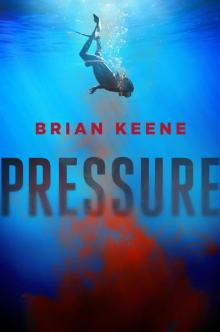 Pressure
Pressure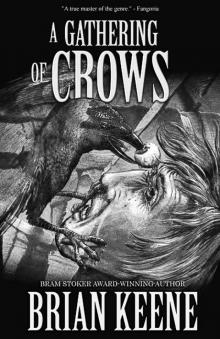 A Gathering of Crows
A Gathering of Crows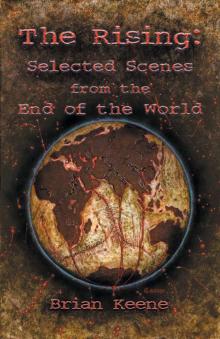 The Rising: Selected Scenes From the End of the World
The Rising: Selected Scenes From the End of the World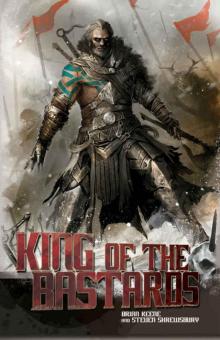 King of the Bastards
King of the Bastards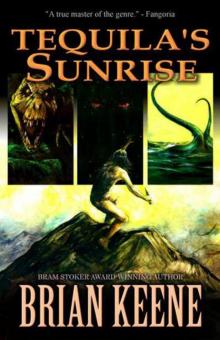 Tequila's Sunrise
Tequila's Sunrise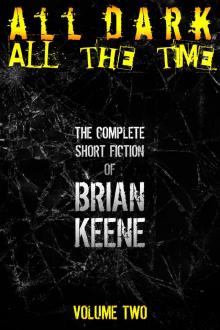 All Dark, All the Time
All Dark, All the Time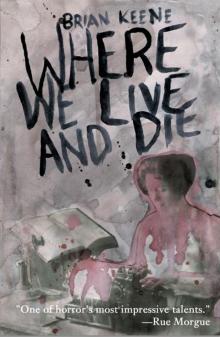 Where We Live and Die
Where We Live and Die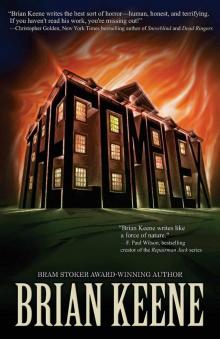 The Complex
The Complex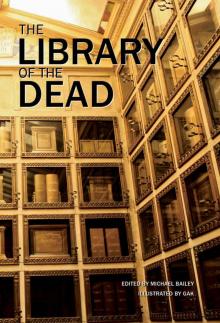 The Library of the Dead
The Library of the Dead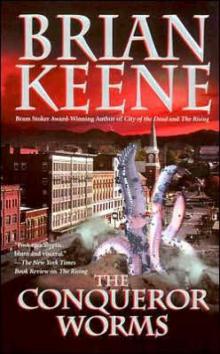 The Conqueror Worms
The Conqueror Worms The Girl on the Glider
The Girl on the Glider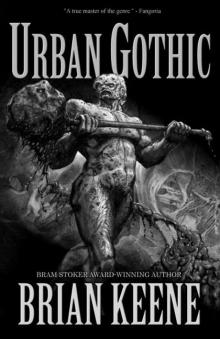 Urban Gothic
Urban Gothic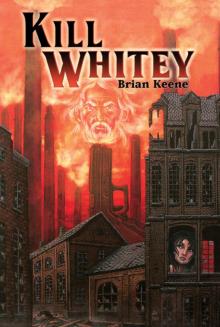 Kill Whitey
Kill Whitey Terminal
Terminal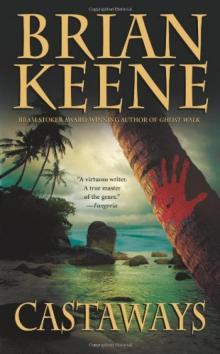 Castaways
Castaways